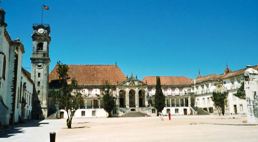Primary Education
Primary and secondary education is compulsory in Portugal. Children aged 6 are required to enrol in primary education (
Ensino Básico – 1º Ciclo) where they take a spread of academic subjects through grades 1 to 4 plus personal and social education. Study content is more advanced during
Ensino Básico – 2º Ciclo, at the end of which they have completed 6 grades and are prepared for middle school.
Middle Education
The 7
th and 8
th grades known as
Ensino Básico – 3º Ciclo correspond to middle school. Subjects include Portuguese and two foreign languages, plus mathematics, natural sciences, physics, chemistry, social sciences and a choice of art. Physical, moral and civic education completes the curriculum, plus light technical orientation to perhaps unlock a talent for a vocation.
Secondary Education
At grade 9, the education system divides. Students choose between an academic or a more practical program (multimedia, electronics, computing and so on). Both share the same core subjects of Portuguese, philosophy, physical education, foreign languages and moral / religious education, with the balance of their schooling directed towards achieving their work goals in life.
Vocational Education
In Portugal, initial vocational training is effectively a third stream of secondary education. Following middle school, pupils enrol for three year vocational certificates. These include practical skills in technical and artistic crafts. Outside of this formal system, numerous vocational colleges offer short and longer-term training too.
Tertiary Education

Higher tertiary education is provided by polytechnics and universities. The former have a practical bias while the latter are more academic. There have been numerous complaints that poor controls have seen tertiary education standards fall, and protests by students and academics have been vociferous.
Notwithstanding this, Portugal boasts many fine academic institutions. The first medieval universities were established in the 13
th Century. The oldest in continuous operation, the Universidade de Coimbra is illustrated here.

 Higher tertiary education is provided by polytechnics and universities. The former have a practical bias while the latter are more academic. There have been numerous complaints that poor controls have seen tertiary education standards fall, and protests by students and academics have been vociferous.
Higher tertiary education is provided by polytechnics and universities. The former have a practical bias while the latter are more academic. There have been numerous complaints that poor controls have seen tertiary education standards fall, and protests by students and academics have been vociferous.